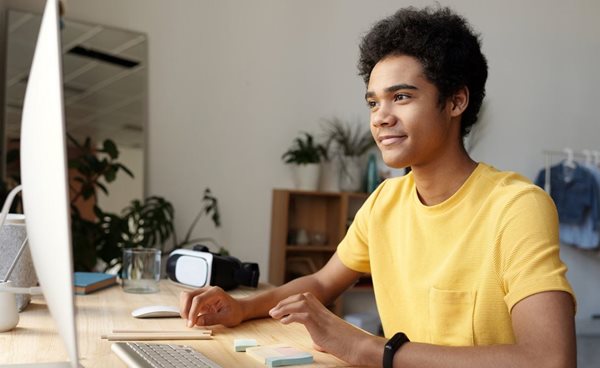
Top stories


Marketing & MediaWarner Bros. was “nice to have” but not at any price, says Netflix
Karabo Ledwaba 15 hours



Logistics & TransportMaersk reroutes sailings around Africa amid Red Sea constraints
Louise Rasmussen 8 hours

More news


















From sending out their daily Snapstreak to parodying the hottest memes on TikTok; trend trawling on Insta to avoid FOMO, continuing lockdown birthday celebrations courtesy of Houseparty; staying on track with their piano lessons on Hangouts and abacus maths via Microsoft Teams. Our children are plugging tech into their lives and in their own way, learning new skills that complement their formal educations.
In the light of South Africa’s Covid-19 lockdown, Youth Day this year has reminded us of the disparity between the haves and the have-nots. The digital divide is troubling, with many of our country’s young people struggling with access to internet connectivity and basic digital devices.
However, the rise of much needed zero-rated platforms and other access-empowering initiatives has been most encouraging. It is indeed true that technology brings the world closer to each other and this period of physical distancing has demonstrated how ICT (Information Communication Technology) can help bridge the gap.
I am proud to head up a team that has continued to invest in leading-edge technology for the past 25 years. While others have been grappling with their digital transformation, we have long been championing mobility strategies to address remote engagement. Our in-house brand (RCT), in particular, has enjoyed huge popularity amongst children and parents alike during lockdown with e-learning and working from home.
Channels, apps and more
It is clear that technology is here to stay and that children have the upper hand in applying it to everyday life and learning. They are critically savvy consumers and companies ignore them at their peril.
YouTube and Netflix stood out as favourites when it came to content on-demand, either for learning or entertainment. Interestingly, the word ‘app’ was applied across all digital devices to any programme, feature or software that enabled the children to interact.
Young Ruan says: “YouTube is my favourite app because it has so many tutorials on programming and technology and random stuff like things that will make you laugh”. Addy commented that: “Other than binge-watch all my favourite shows, I love YouTube and Snapchat”.
Instant messaging on WhatsApp or video calls via Microsoft Teams were easily received as digital communication progression, but with all of the children we interviewed, nothing compared to good old-fashioned playing together outside.
Charlotte observed that lockdown meant: “Not seeing anyone, not being able to do any sports and being stuck with people and you can’t really go anywhere if you have an argument with them (siblings)”. Ruan added that: “I can’t go outside and ride my go-kart and not see my friends but Houseparty, Fortnite, Minecraft and a lot of other apps helped me connect with all of them”.
It’s not all fun and games
The pandemic has placed a spotlight on the importance of education and how technology can assist in bringing relevant skills to our youth. Our hope for them is gainful employment after their formal education. A variety of online tools have been made available to address the need for equipping and upskilling our youth in becoming all they can be for our country and as part of the global community.
We have seen how our spectrum of mobility software solutions have helped facilitate remote education by narrowing down information searches and providing adaptable interfaces across devices, from tablets to laptops and desktops.
It was heartening to see the expression of self-regulation coming through as the children took more responsibility over their schoolwork and time online. Jaimi explained that: “Tech can keep you busy, but I dislike that sometimes some games can attract you so much that you play it 24/7”. Charlotte remarked that: “To pace myself, it’s kinda like self-discipline. There is no one at you all the time like, hand in your assignment, you know”.
Addy added that: “Technology has definitely made it easier to learn, but the bucket-load of work (in reference to e-learning) isn’t nice. Technology opens so many doors and makes life easier but (for) all the negativity that is being spread”.
Ruan reckons that: “The best thing I have learnt during lockdown is programming and stop motion using Lego and editing it afterwards”.
Daily device interactions
Not only are our children resourceful in how they obtain their tech, hustling for pocket money by doing additional household chores during the lockdown, they are also diverse in how they incorporate their digital devices into their daily interactions.
Locked down at home, caregivers can attest to the fact that children have become particularly creative in finding more features on even the most limited devices. Adults have become aware that children’s online sharing as citizens of virtual reality has increased exponentially. Covid-19 has accelerated the onset of a truly digital society, changing interaction in all spheres of our life, and challenging parents to learn new skills in facilitating and guiding our children from within their own tech worlds.
Adult supervision is key when our children are engaging online. When children are on these diverse platforms, caregivers must set up those devices in a way that only allows the child to use the tools within the scope appropriate to their age and one’s family values. Parental control is more important than ever before as we seek to encourage our children in their adoption of technology.
As both a mother and a female leader in tech, I am proud to have overseen the availability of Bitdefender security software that equips and helps other parents in monitoring their children’s screen time and blocking potentially harmful apps. Apart from customisable security software for our digital hardware (which includes laptops and tablets), it is also been helpful that we offer mobile and productivity cloud solutions for working from home and schooling from home. Microsoft 365 for instance, allows one to access work documents or school assignments from any device and Microsoft Teams enables remote connectivity with ease.
Moving forward in learning new skills
We asked the kids what they have learnt in lockdown and Jaimi replied that: “You can’t be too careful; you must always wash hands and also that no school isn’t really as fun as it sounds”.
Covid-19 has exercised our boundaries of collaboration: whether it is the kids of the urban suburbs plugging into code-building collabs and online gaming tournaments, or when our children are engaging their avatars and fan-following their crushes online, children learn new skills no matter what their tech and accessibility.
This Youth Day, if we are to help them safely chase their dreams, we too must embrace the pace of technology, tapping into the creativity that our youth apply to their tech every day.
